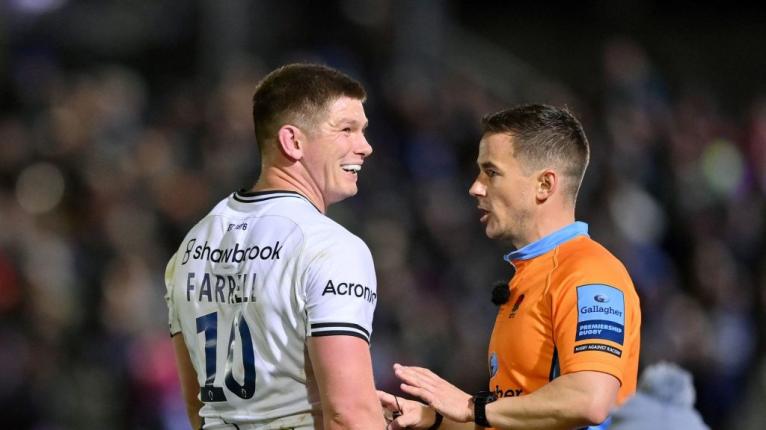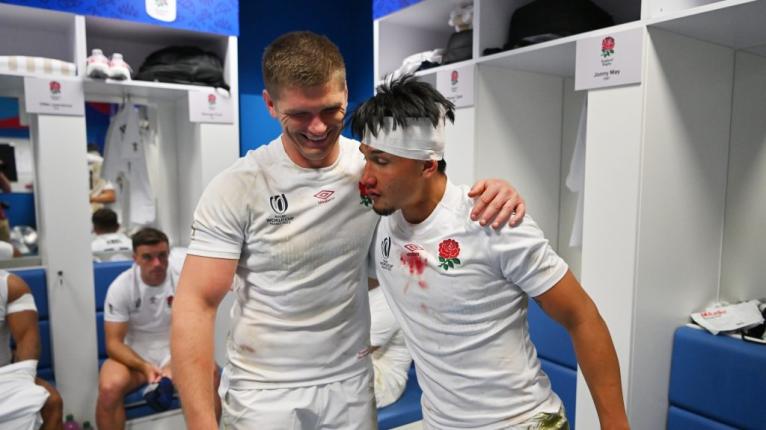Less than six months ago Owen Farrell was setting the tongues wagging on social media for all the wrong reasons. Saracens had just beaten Bristol in the Gallagher Premiership 39-31, but ‘Faz’ had missed six kicks at goal for the first time in his professional career. He had also gotten into a spat with referee Luke Pearce, just for good measure.
The home side are awarded a penalty, with an irate Farrell pointing out ‘that’s three [penalties] at the maul’. England’s premier official is never one to back down: ‘Thanks, I can count’, he responds sarcastically. Just before Billy Vunipola drags Farrell away by the elbow, he retorts ‘don’t be rude to me, there is no need to be rude to me.’ A storm in a teacup in the ordinary world maybe, but still worth 1.6m views on the virtual landscape of Twitter.
Somehow it is typical of the character of the man he came back to lead his club to an even more decisive victory away from home against the same opponents last Saturday. After giving up an early 13-3 lead to their hosts at Ashton Gate, Saracens proceeded to score 38 of the next 45 points to run away with the game, scoring four tries in the process to secure the maximum five points.

When things go wrong, as they inevitably do, Farrell is the man you want on your side. In the face of adversity his level of play rises, sharply and immediately. The grit in the psyche is exposed, the focus clarifies and more often than not, it transforms into a pearler of an on-field performance. Maybe he thrives on intense friction and the need to resolve it. In any case, it is a very rare quality in the gift of only the top-drawer elite sportsman or woman. For Owen Farrell, read Novak Djokovic.
The post-match comments of Saracens director of rugby Mark McCall about his club’s underlying attitude are distilled perfectly by its spiritual leader on the field.
“If you can just drop what has happened and put all your energy into what’s next, that’s the goal all the time. We have had some tough team moments but there have also been enough really, really good performances. Our defensive performance was as good as I can remember for a good while.”
Harlequins’ prodigy Marcus Smith has all the talent you could ever want in a 10, but it is that iron will to win, and the ability to find a way – any way – to win that he needs to cultivate as his career develops and matures. He will then be worthy of sharing the same headline as Farrell, as one of the great England pivots.
Nothing epitomises the complexity of the Owen Farrell debate than the comments of The Times rugby correspondent Stuart Barnes. The ex-England fly-half, who himself played Marcus Smith to Rob Andrew’s Owen Farrell in his salad days, has swung between the depths of criticism and the heights of praise in his appreciation of the North London playmaker over the years. He was on the heights before the 2019 World Cup:

“As for Farrell, he [is] superb. The argument over the England World Cup number 10 has been put to bed. There is a decisiveness to his game that lifts those around him and a fierceness of determination rare even at the heights of international sport.”
Roll the clock forward a couple of years, and Farrell had dropped to the depths – or at least, well behind Smith in Barnes’ England pecking order.
“Smith is the English [Finn] Russell. Like the Scot, he is not a maverick. He is an intelligent player with razor-sharp instincts. He has been trained to see things as they unravel in front of him. The antithesis of Farrell, who has appeared the ultimate game-plan player throughout the Jones years.
“To play anyone but Smith this autumn would be to strip bare any talk of 2023-planning as empty rhetoric. Two years out from the World Cup, there is plenty of time for Farrell to reignite his case, back in the improving Premiership.
“But Smith has less time to grow into a Test match 10. All the evidence indicates he has the skill, nerve, wit and kicking boots to pull England from the mess of their own making.”
In the ironic event, George Ford was picked at 10 with Owen Farrell at 12 in 2019, with Farrell taking over the reins four years later for the crucial knockout stages. But the struggle in assessing Farrell’s worth as a game manager against a more instinctive number 10 like Smith is painfully evident. It is screaming out from centre-stage.
A major part of the conundrum is the depth of a game-manager’s strategic thinking, their ability to ride over individual errors in the interests of the long-term picture. At Ashton Gate, Farrell was quite content to make mistakes in the early part of the match to get the pictures he wanted to see from the defence later in the game. He was quite confident in his ability to turn it up a notch when it really mattered.
Farrell started the game with three short attacking kicks in the first quarter, none of which was recovered by a Saracens player. One cross-kick to the far wing even went straight into touch on the full.
The idea is twofold: to pull a defender out of the Bears’ backfield and open the deep kicking game; and to widen the defensive spacings in the line for thrusts through the middle with ball in hand.
Even towards the end of the first period, the Bristol backfield was in a right old state, unsure where to position itself. Farrell exited well beyond the Bristol 40m line on three occasions when the backfield came up anticipating the crosskick, including one devastating 50/22 lineout turnover.
From exactly the same spot inside his own 22, on this occasion Farrell outmanoeuvres his old clubmate Max Malins by changing tack with a massive downfield punt. Once he got the men at the back guessing, he was unafraid to return to the cross-kick.
Nine times out of 10, or even 99 times out of 100, ex-basketballer Theo McFarland takes that kick-pass and strolls to the line for the score.
The other principle behind the strategic kicking game was using the ‘stretch’ towards the sideline to open holes inside.


Once the ball has been centred in the shadow of the posts by the first phase, you can clearly hear Farrell shouting ‘far side, far side’ on the next play. There is no intention of playing wide-wide to the right touch, but instead working straight through middle with strength in contact and the offload, despite the presence of a man extra on a yellow card. At all times, Farrell keeps an iron grip on the big picture: the Bristol backfield has been spread to the edges and away from the middle because that is the way he has foreseen it.
Farrell’s other great point of difference is his physicality and leadership on defence, despite the regular brickbats directed at his high league-style tackling technique. Where best to hide a smaller 10 in defence? It has become a universal bugbear for defensive coaches, with players such as Ford shifted to variously to full-back, blindside wing, the 13 channel and even into the tramlines at lineout to mask their lack of size.
Farrell does not need any camouflage, and he has forged as potent a partnership with 12 Nick Tompkins on defence as he has with Elliot Daly and the two Alexes, Goode and Lozowski, on attack.
In both cases Farrell confidently passes off the first receiver to combine in a damaging double-tackle with Tompkins. He is even strong enough to add his weight to the defence of a driving maul and make it count, and not too many 10s can make that claim and mean it.
Farrell will probably not be a factor in England selection for as long as he is playing his club rugby for Racing 92 in Paris. Perhaps that is good fortune for England head coach Steve Borthwick. Were the Smith-Farrell national debate still alive, it might still be horribly hard to pick a winner.
Smith still has all the talent, but Farrell knows what it takes to win at the highest level. While the Harlequin’s game management is improving, he cannot rival the Saracen’s drive and leadership, especially on the defensive side of the ball.
“There was a saying in Umuofia that as a man danced, so the drums were beaten for him” [Chinua Achebe, Things Fall Apart]. England may be dancing to a different tune over the next World Cup cycle, but they would do well to remember the value of a man who can conduct the orchestra, and indeed, make the music follow him to France.


The situation is absolutely absurd. Rugby fans - all of us - are being deprived of seeing a truly great player. What is it about the English press that makes this sort of thing happen?
They’re English.
OF would not have payed more than 40 Tests if he had been born in Wales, Ireland, Scotland or France. He started 2/9 Lions tests at flyhalf. Good club player.
lol. That’s a good one.
I think Farrell despite all of the stick he gets in the media is still one of if not the best fly half in the world. He is literally the full package. He can kick one of the best in the world, probably has the best defensive game of a fly half in the world and if he wants to he can run, take contact and find an offload to keep the pace of the attack. I dont know why he isnt spoken more about still being one of the best in the world with the likes of dupont. Farrell is the ultimate captain and team leader and is experienced- he has been in nearly any situation you can think of. I still believe due to these reasons that he is England’s best ever player and is still one of the best players in the world.
A fair summary. For whatever reason he has never been a media darling, and ofc having that League background doesn’t help either! But as a player and leader simply taken, top man.
The Farrells are one of the great father and son combinations. Andy was an RL great, and had he played Union as his first sport, I would be sure he would have been avery significant forcewas in League. And Owen, a Union great, who had he played League, would could have been a great there too i all probability.
I feel my attitude to Owen has mellowed as he has aged, and in the post Jones era, evolved and shown his full range of talents. He really is an all round player, and I have wold hope his move to France will be successful. He may even be the piece in the jigsaw that Racing need to rise to challenge Toulouse and LAR. He is ofc now approaching 33 years of age but should still have enough left to make a big contribution in France for at least2/3 years.
Yes I reckon he has still has two or three big years left in him Miz, he may even go on as long as the ageless Johnny Sexton. Perhaps it really is true that #10’s are turning into QBs like Tom Brady, playing into their late 30’s!
Haha did he also* say it in a sarcastic teacher sort of manor or was it the petulant English snob sort of wail?
Lp does tend to react strongly in those situations, and he can become quite high-pitched.
He’s a dominant personality. That might be both a good and bad thing in team dynamics.
Certainly it ruined Smith’s first crack at 10 with Owen at 12.
BTW, Bristol flatter to deceive. When things really matter, they tend to deliver less rather than more. Farrell would have been good for them
Strangely enough, it worked well with OF at 12 and Johnny Sexton at 10 on the Lions tour of NZ in 2017. Both strong personas but they had not problem combining, and apparently did most of the attack coaching on that trip too!
It's been an unusual era of unpopular, highly competitive, domineering, fairly big fly halves in the home nations with Farrell, Sexton and Biggar. Russell is different in personality and player I think.
I'd rank Sexton first of the three because he is just as good a game controller but also has a great passing game. And his competitiveness never seems to cause problems with refs.
How is Russell not the clear ‘best fly-half’ in the UK? Oh wait, Scotland don’t win when it counts…hmm
Farrell is a good flyhalf but is not creative on offense. Would be fine if other England backline players would step up but they don’t…pretty consistently
“Never cause a problem with refs”….jeez, I just got back up off the floor from that beauty!!!
Tell that to the ref team that were roundly abused live on global tv by a non playing sexton, young son in hand, as they went forward to collect their medals at the CC final. Truly one of the worst examples towards refs ever seen on a rugby pitch…
Yes Johnny Sexton was a big 10 who could tackle high, Beaudy Barrett also far from diminutive and pretty physical.
But Johnney ahd a fair few spats with refs, don’t be deceived! Prob as many as Owen….
Owen Farrell is one of the most polarising figures in the game. His entire attitude on the field (and sometimes off of it) smacks of arrogance and he is about as brash as Donald Trump in a political debate. Yet behind that facade is a calculating, determined and powerful leader who drives any team forward with an Iron will. You are right in that he gets better in the heat of battle and in the face of overwhelming odds. He develops a narrow focus and he delivers his best in a way that few others can. He is one of Englands great performers who sacrificed alot for the team and who often bears the weight of responsibility of leadership alone on the field and in front of the media. Despite what many think of him he is a fantastic game manager with a good rugby brain. He will be sorely missed from the international stage
Great summary Shay. Not everyone’s cup of tean but one of his great strengths is he realizes he doesn’t have to be. He doesn’t pretend to be a follower of decide stuff by committee, he’s a leader.
Within that he forms very productive playing relationships with those mentioned - Goode, Lozowski, Daly and Tompkins - so it does not inhibit his sense of ‘Team’. The exception of Smith-Faz which was disjointed for a number of reasons.
great article - although I can’t help wonder whether the more relevant debate over coming years will be between Ford and Fin Smith!
Finn Russell vs Fin Smith is well worth a watch this weekend unless one of them is given a rest before the Gallagher Premiership semi finals.
Do you mean between Marcus and Fin? - they are the same generation!